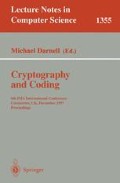Abstract
A novel technique that allows efficient trellis decoding for the M-choose-T synchronous multiple access (MA) adder channel is investigated. Decoding in the M-choose-T system is performed in two operations, identifying the set of active users in the channel and decoding the received data according to which set of users are active. The results show that a sufficient performance improvement is achieved without the need for additional information regarding the active users. The application of the proposed technique to the quasi-synchronous MA adder channel is also analysed. The modified decoding procedure shows a further improvement when compared to the conventional hard decoding technique.
Preview
Unable to display preview. Download preview PDF.
References
P. G, Farrell “Survey of channel coding for multi-user systems”, in Skwirzynski, J.K. (Ed.): ‘New concepts in multi-user communications’ (Sijthoff and Noordhoff, 1981), pp. 133–159.
T.Kasami and S.Lin, “Coding for a multiple access channel”; IEEE Transactions. on Inform. Theory, Vol. IT-22, No.2, pp 129–137, March 1976.
G.Markarian, B.Honary, P.Benachour, “Trellis decoding techniques for the binary adder channel with M users”, IEE Proceedings on Communications, vol. 144, 1997.
P. Benachour. G. Markarian, B. Honary, “ Trellis decoding techniques in an M-choose-T multiple access adder channel ”, in Proceedings of the 4th Int. Symp. On Communication Theory and Applications, Ambleside, UK, pp 84–85, July 1997.
V.Sidorenko, G.Markarian, B.Honary, “Minimal trellis design for linear codes based on the Shannon product ”, IEEE Trans. Inform. Theory, vol. 42 pp.2048–2053, Nov. 1996.
B. Honary, G. Markarian, “ Trellis decoding of block codes: A practical approach”, Kluwer Academic Publishers, 1997.
P.Mathys, “A class of codes for T active users out of N, for a multiple access communication system,” IEEE Trans. Inform. Theory, vol. 36 pp. 1206–1219, Nov. 1990.
T. Kasami, S. Lin, V. Wei, and S. Yamamura, “ Graph theoretic approaches to the code construction for the two-user multiple access binary adder channel,” IEEE Trans. Inform. Theory, vol. IT-29, pp.114–130, 1983.
R. J. McEliece, E. C. Posner, “Multiple access channels without synchronisation,” in Conf Rec. Int. Conf on Communication, vol. 2, pp. 246–248, 1977.
S. Lin, V. K. Wei, “Non-homogeneous trellis codes for the quasi-synchronous multiple access binary adder channel with two users”, IEEE Trans. Inform. Theory, vol. IT.32 pp.787–796, Nov. 1986.
Author information
Authors and Affiliations
Editor information
Rights and permissions
Copyright information
© 1997 Springer-Verlag Berlin Heidelberg
About this paper
Cite this paper
Markarian, G., Benachour, P., Honary, B. (1997). Novel decoding technique for the synchronous and quasi-synchronous multiple access adder channel. In: Darnell, M. (eds) Crytography and Coding. Cryptography and Coding 1997. Lecture Notes in Computer Science, vol 1355. Springer, Berlin, Heidelberg. https://doi.org/10.1007/BFb0024466
Download citation
DOI: https://doi.org/10.1007/BFb0024466
Published:
Publisher Name: Springer, Berlin, Heidelberg
Print ISBN: 978-3-540-63927-5
Online ISBN: 978-3-540-69668-1
eBook Packages: Springer Book Archive

